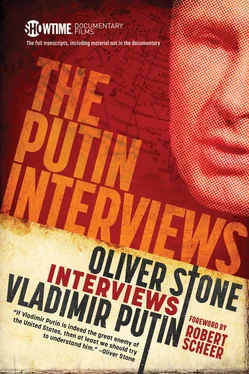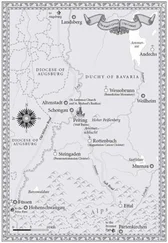OS:But that was afterward. Why did you resign? I mean this is your career.
VP:I’m going to tell you everything. So when Sobchak invited me to work for him, I told him that I was very much interested in working with him. But I thought that it was impossible. And that it was not the right thing to do. Because I was still an officer of the external intelligence service of the KGB. And Sobchak was a prominent Democratic leader—a politician of the new wave. And I told him directly that if someone were to know that I worked side by side with him, as a former KGB worker, it was going to do damage to his reputation. And back then the country was witnessing very acute political strife. But I was very much surprised at Sobchak’s reaction when he told me, “Oh that’s nothing to me.” And I worked for him for a short time as his adviser. And afterwards, when the coup d’état was attempted, I found myself in a very ambiguous situation.
OS:In August, ’91?
VP:Yes, the coup d’état was attempted with the use of force. And I could no longer be an officer of the KGB while remaining a close adviser to the democratically elected mayor of St. Petersburg. And that’s why I resigned. Sobchak made a telephone call to the president of the KGB of the USSR. And he asked him to let me go. And he gave his consent just a couple of days later for the decree and my resignation to be issued.
OS:But in your mind, did you still believe in communism? Did you still believe in the system?
VP:No, certainly not. But at the beginning I believed it and the idea is a good one and I believed in it. And I wanted to implement it.
OS:When did you change?
VP:You know, regrettably, my views are not changed when I’m exposed to new ideas, but only when I’m exposed to new circumstances. It became clear that the system was not efficient and the system was at a dead end. The economy was not growing. The political system was stagnating. It was frozen and was not capable of any development. The monopoly of one political force, of one party, is pernicious to the country.
OS:But these are Gorbachev’s ideas, so you were influenced by Gorbachev.
VP:These are not ideas of Gorbachev. These ideas were put forward by the French socialist Utopians, [6] Background Information: The French Utopian Socialists believed in an egalitarian society which would be established through small, “model communities that set examples of harmonious cooperation to the world.” Theirs was a vision of radical democracy on a small scale, gradually leading to a better world. The Marxian socialists, on the other hand, especially as manifested in the creation of the Soviet Union, believed that socialism would be built through a “clash of social forces,” eventually leading to a workers’ state which initially would take the form of the dictatorship of the proletariat. In other words, this was a view of socialism brought about, not gradually or gently, but, out of necessity, by the revolutionary struggle of workers (and, the Russian revolutionaries would add peasants) which initially would have to create a strong state to suppress the former ruling class made up of industrial owners and large land owners. See, e.g., “Socialism,” Terence Ball, Richard Dagger, Encyclopedia Britannica , retrieved at: https://www.britannica.com/topic/socialism
so Gorbachev has nothing to do with these ideas. Gorbachev was responding to the circumstances. I reiterate—his merit is that he felt this need for changes. And he tried to change the system. Not even change, he tried to renovate it, to overhaul it. But the problem is, this system was not efficient at its roots. And how can you radically change the system while preserving the country? That’s something no one back then knew—including Gorbachev. And they pushed the country towards collapse. [7] Background Information: For more detail on the economic chaos and social dislocation brought about by the rapid changes of Perestroika and the collapse of the USSR which resulted, see, Cohen, Stephen F., Soviet Fates and Lost Alternatives: From Stalinism to the New Cold War (Columbia University Press, 2011).
OS:Yeah, that must have been traumatic. The Soviet Union collapsed, and the Russian Federation was formed under Yeltsin. But I was in St. Petersburg in early ’92 and I met with Sobchak. I think I may have met you—who knows, if you were an assistant to him back then.
VP:No, I don’t remember, but I want to tell you that Sobchak was an absolutely sincere, wholesome man. From an ideological point of view, he was a Democrat, but he was categorically against the disintegration of the Soviet Union.
OS:He was against the disintegration. Yes, it was a wild time, it was exciting. It felt like it was a birth of something new and no one knew where it was going. There were gangsters, there were—people were different. They were wearing new clothes. I had been in the Soviet Union in 1983 during the Brezhnev era and was very depressed by it. So when I came back seven or eight years later it was unbelievable to me. Sobchak took us to a fancy restaurant and we had a wonderful time with him.
VP:But back then, at the same time, when the fancy restaurants appeared, the Russian social security system was destroyed completely. Whole branches of the economy stopped functioning. The healthcare system was in ruins. The armed forces were also in a very depressive condition, and millions of people were under the poverty line. And we have to remember that as well.
OS:Yes, that was the other side of it. You moved to Moscow in 1996 and became the head of the Federal Security Service for 13 months.
VP:No, not right away. I moved to Moscow and at first I was supposed to work for President Yeltsin’s administration. And I started to work in the office of the administration of President Yeltsin. I was in charge of legal matters. And afterwards I was transferred to the administration. And I was responsible for the Oversight Directorate. This Department was overseeing the government and the regional administrations. After that I became the director of the Federal Security Service (FSB – Federal’naya Sluzhba Bezopasnosti).
OS:Right, so in that role you must have seen what a mess this was, I gather. It was a nightmare of chaos.
VP:Yes, certainly. I often hear criticism addressed to me. They say that I regret the collapse of the Soviet Union. To start with, the most important thing is that after the disintegration of the Soviet Union, 25 million Russians—in a blink of an eye—found themselves abroad. In another country.
That’s one of the greatest catastrophes of the 20th century. People used to live in one country; they had relatives, work, apartments, and they had equal rights. And yet in an instant they found themselves abroad. And there were certain signs and then full-fledged civil wars. Yes, I saw that all personally, especially when I became director of the Federal Security Service.
OS:And in 1999 you worked your way up to be the acting Prime Minister. And Yeltsin resigned in 2000. Obviously, just looking at press conferences and film of Mr. Yeltsin, he was clearly alcohol diseased. His brain seemed to be—the way he spoke and the way he stared at the camera, the way he moved—he looked like he was catatonic.
VP:You know, I do not think that I have the right to give any assessment—either about Gorbachev, or the personality of Yeltsin. Well, I told you that Gorbachev didn’t understand what had to be done, what the objectives were and how to achieve them. And yet he was the first to make a step towards giving the country its freedom, and that was a historical breakthrough. Quite an evident fact—and the same thing goes for Yeltsin. Just as any one of us, he had his problems, but he also had his strong side and one of those advantages was that he never tried to avoid, to shirk responsibility, personal responsibility. He knew how to assume responsibility. Even though certainly he had his demons. But what you said is true. It’s no secret. It was also the reality.
Читать дальше












